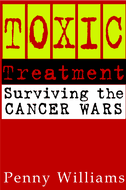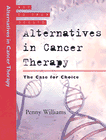New Cancer Therapies - The Patient's Dilemma
If you want to read about the exploits of Bill O'Neill of the CCRG and other cancer quacks around the world, then you need to read one of Penny Williams' books.
|
Penelope Williams' book is her latest revelation about alternatives cancer therapy. It is now called simply "New Cancer Therapies - The Patient's Dilemma" .
The new book, as far as we know, is the third different title used by the publisher here and in the U.S. If you want to read about some really weird happenings in the world of cancer treatment, and you don't mind reading a chapter about Bill O'Neill, then by all means buy one of her books. The first Williams alternative cancer edition was published in Canada by Key Porter Books and was called "Alternatives in Cancer Therapy - The Case for Choice" back in 2000. Bill O'Neill was featured in that book. It was then basically retitled as "Toxic Treatment - Surviving the Cancer Wars". As far as we know this basic book has been published and republished at least three times to fit the market.  This is the cover of the older book. It is now out of print. But I am sure that you may find it in a used bookstore in Canada.
 Penelope Williams Key Porter Books ISBN - 1552631133 Amazon Quackery Books
|
Excerpts from Chapter EightBill O'Neill is in a very unique position. Angry at the world and at the entire medical oncology establishment, he wants to remake the world. So, he founded what he calls the CCRG (Canadian Cancer Research Group), in 1993. He probably chose those initials quite on purpose. There are several other established cancer treatment centers around the world that use those same intitials. William's tells the story of Liam, Bill O'Neill's son, and the family's struggle with the medical establishment. It paints a picture of Bill as an unhappy camper. So, here is a short exerpt of the conclusion. You can tell from her closing remarks that something worries her, and some of us as well.
Most oncologists are wary of Bill O'Neill and his group, labeling him Dr. Hype. But patients who are on some of the treatments provided by the CCRG call him Dr. Hope. He's not a doctor, although one oncologist flatly refuses to believe this, asking him to consult on some cancer cases. His medical team now includes GPs, pharmacologists, and biochemists. No oncologists, though, because (he grins slyly), "Most oncologists are not qualified to treat cancer."
"It's like this," he says.
Bill does not choose words carefully. His son's experience has effectively deleted any diplomacy; he is a very angry man, and is content to antagonize the medical establishment he believes nearly killed his boy. You will have to read this book to get a flavor of what Bill has gone through to bring him to this point. If anyone cares to see some of Bill's posts on the internet in regards to his opinion of the medical establishment, we have a fine collection.
|